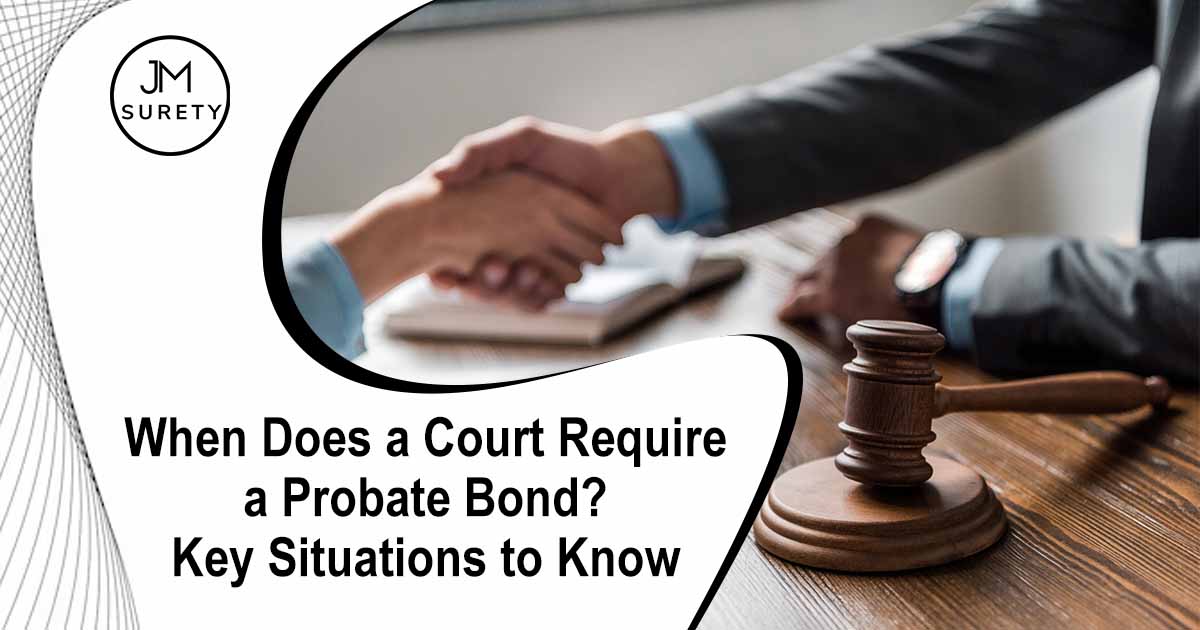For those recently appointed as an executor, administrator, guardian, or conservator, one of the first legal questions to address is: When does a court require a probate bond? Before beginning the estate or guardianship process, it’s essential to know whether the court requires bonding in your situation. While JM Surety’s probate bond guide explains how to obtain a bond, this article outlines the most common circumstances when courts mandate one.
What Is a Probate Bond? (And Why It Matters)
A probate bond is a type of court bond that ensures the appointed individual—such as an executor, administrator, guardian, or conservator—will fulfill their legal responsibilities ethically and in accordance with the law. If they fail to do so, the bond provides financial protection for beneficiaries, heirs, and creditors. For more information on how to apply for a probate bond, visit JM Surety’s probate bond page.
When Does a Court Require a Probate Bond? Common Scenarios
Courts may require a probate bond in situations where they believe there is a higher risk of mismanagement, fraud, or conflict during the estate or conservatorship process. The decision to require a bond often depends on factors such as the presence or absence of a will, the value of the estate, and the relationship or credibility of the appointed fiduciary. Bonds serve as a layer of financial protection for heirs, beneficiaries, and creditors if the appointed individual fails to fulfill their duties. While some estates may be exempt from bonding requirements, many fall into categories that trigger a mandatory bond. Below are the most common scenarios where a probate bond is typically required.
No Will or Intestate Estate
When an individual passes away without a valid will, they are considered to have died intestate. In such cases, the probate court appoints an administrator to manage the estate and distribute its assets by state intestacy laws. Because there is no will to name a trusted executor or include a bond waiver, the court typically requires a probate bond to be posted. This bond acts as a safeguard to ensure the administrator performs their duties lawfully and responsibly. It also provides financial protection for heirs and beneficiaries in the event of mismanagement or misconduct.
Executor or Fiduciary Lives Out of State
When an executor, personal representative, or guardian lives outside the state where the probate is filed, the court may view this as a potential risk. Physical distance can make it harder to oversee estate activities and maintain consistent communication with heirs, beneficiaries, and the court. This can also delay estate administration or create logistical challenges in managing local assets. To reduce the risk of mismanagement, courts often require a probate bond from out-of-state fiduciaries. The bond helps guarantee that the appointed individual fulfills their legal duties and protects the estate’s interests regardless of location.
Will Does Not Waive the Bond Requirement
Some wills include specific language waiving the need for a probate bond, which can eliminate the requirement for the named executor to post a bond. However, if the will does not mention bond requirements or provides unclear language, the court may still require one. Judges often err on the side of caution to protect the estate, especially when significant assets are involved. A probate bond ensures the executor performs their duties faithfully and without conflict of interest. This protection benefits not only the beneficiaries but also creditors and other interested parties.
Estate Value Is Substantial
High-value estates often pose a greater financial risk due to the complexity and size of the assets involved. These may include real estate, investment portfolios, business interests, or valuable personal property. To safeguard these assets, courts are more likely to require a probate bond when the estate’s total value is significant. The bond serves as a financial guarantee that the executor or administrator will manage the estate properly and in compliance with legal obligations. This requirement helps protect beneficiaries from potential loss caused by errors, negligence, or misconduct.
Heirs or Beneficiaries Contest the Will
When a will is contested, or disputes arise among heirs, the probate process becomes more complex and potentially contentious. These challenges may involve claims of undue influence, questions about the will’s validity, or disagreements over the distribution of assets. In such cases, the court may require a probate bond to reduce the risk of mismanagement or biased decision-making. The bond holds the executor or administrator financially accountable if they fail to act by the law. This added layer of protection helps maintain trust in the administration process during legal disputes.
Objections to the Appointed Executor or Fiduciary
If family members or other interested parties raise objections to the court-appointed executor, administrator, or guardian, the judge may view the situation as potentially high-risk. These objections can stem from concerns about the individual’s integrity, experience, or potential conflicts of interest. In response, the court may require a probate bond to ensure the appointed party acts in good faith and within the limits of their authority. The bond provides reassurance that if the fiduciary fails in their duties, affected parties have financial recourse. This requirement helps maintain fairness and accountability throughout the probate or guardianship process.
Can a Judge Require a Probate Bond Even If the Will Waives It?
Yes, a judge can still require a probate bond even if the will includes a waiver. While many wills contain language to eliminate the bond requirement, the court has ultimate authority to impose one when necessary. This typically occurs when the judge identifies potential risks, such as disputes among beneficiaries, a large or complex estate, or doubts about the fiduciary’s ability to manage the estate properly. The court’s priority is protecting the interests of heirs and creditors. Requiring a bond in these situations ensures financial accountability and minimizes the risk of estate mismanagement.
Why Do Courts Require Probate Bonds?
Probate bonds are used by courts to reduce the risk of financial loss during the estate administration process. They serve as a form of insurance that protects beneficiaries, heirs, and creditors if the appointed fiduciary fails to fulfill their duties. The bond holds the executor or administrator legally and financially accountable for mismanagement, fraud, or negligence. Courts require these bonds to promote trust, transparency, and proper conduct throughout the probate process. If a violation occurs, the bond allows harmed parties to seek compensation.
When Might a Probate Bond Be Waived?
A probate bond may be waived if the decedent’s will clearly states that no bond is required and the court accepts that provision. Courts are more likely to honor the waiver when the estate is straightforward, and the named executor is trusted. In some situations, if all beneficiaries agree and the estate presents a minimal financial risk, the judge may approve the waiver even without a will. However, courts retain complete discretion and can still require a bond if concerns about mismanagement or conflict arise. The decision ultimately depends on the circumstances and the court’s assessment of potential risk.
What Happens If You’re Required to Get a Probate Bond?
If a probate bond is required, the court will include this instruction in the official appointment documents provided to the executor, administrator, or guardian. The bond must be secured and filed before the individual is legally authorized to carry out any duties related to the estate. Acting without the required bond may violate court rules and delay the probate process. In some cases, failure to obtain a bond can result in the court revoking the appointment or appointing someone else in its place. Promptly securing the bond is essential to move forward with estate administration legally and efficiently.
How to Know for Sure
To determine whether a probate bond is required, review the court’s official appointment order or notice, as this document will specify whether bonding is necessary. In some jurisdictions, the requirement may also be listed in local probate rules or communicated during a hearing. If the language is unclear or you did not receive complete documentation, do not assume a bond is unnecessary. Consulting a probate attorney can help clarify your legal obligations and avoid delays. You can also contact a licensed surety bond provider like JM Surety for expert guidance on whether you need a bond and how to secure it.
How to Get a Probate Bond
To obtain a probate bond, you must apply through a licensed surety agency and provide supporting documents, including your court appointment or order. The agency will evaluate your application based on financial responsibility and the bond amount set by the court. Many providers, like JM Surety, offer quick approval—often within 24 hours. First-time executors and administrators can also receive step-by-step assistance to avoid delays or mistakes in the bonding process. Working with an experienced surety company helps ensure compliance and faster access to your fiduciary responsibilities.
What Happens If You Fail to Secure a Required Bond?
Failing to obtain a required probate bond can lead to significant legal and procedural setbacks. The court may delay or block your ability to act on behalf of the estate until the bond is secured. In some cases, your appointment as executor, administrator, or guardian may be revoked entirely. Taking any fiduciary actions without the mandated bond could expose you to personal liability and legal consequences. To avoid these risks, it’s essential to fulfill the bonding requirement promptly and in full compliance with court orders.
Need a Probate Bond Fast? Contact JM Surety Today
Don’t wait for probate delays or court complications. JM Surety makes it simple for first-time executors, administrators, and guardians to secure a probate bond quickly and affordably.
✔️ Fast approvals – often within 24 hours
✔️ Expert guidance for those new to the process
✔️ Competitive rates with nationwide coverage
📞 Call us today at (972) 848-0820 or 📝 Submit your request through our secure contact form to get started.

